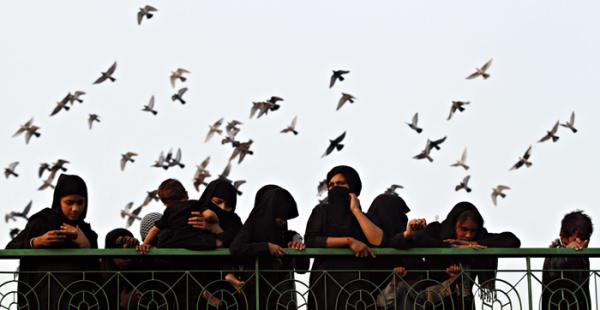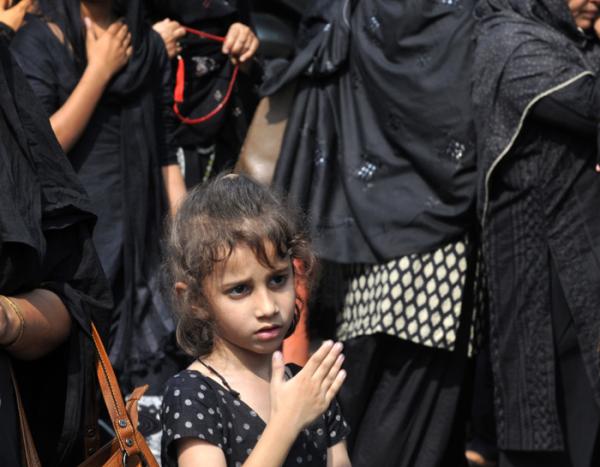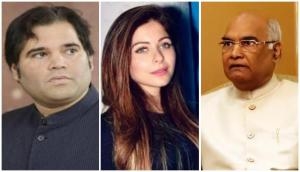
At a time when all political parties are playing on the religious intolerance card in country, members of the Hindu community in Lucknow will mourn and take out Tazias' on 24 October- that is the 10th day of Moharram (Ashura) as a mark of respect for Imam Hussain, grandson of the Prophet Mohammad.
Moharram mourning is observed all over the world, largely by the Shia sect of the Muslim community, but Hindus in large numbers take part in the mourning with great reverence and devotion in Uttar Pradesh's capital city Lucknow.

Photo: Getty Images
Moharram in the present time
On the day of Ashura, people in Lucknow mourn the martyrdom of Imam Hussain, and this day presents an unparalleled example of Hindu-Muslim unity in Lucknow.
A large number of Hindus participate in the 'azadari' processions, including the 'aag ka maatam' (in this people walk on a carpet of red hot coal).
Speaking to Catch, Arvind Singh whose family mourns the death of Imam Hussain said, "Since I was a child my mother used to tell me that the month of Moharram has begun and used to take me to Majlis (religious congregation), also on the 10th of Moharram we took Tazias in the Moharram processions."
He added that this tradition in their family continues till date. His 11-year-old son too has been performing 'aag ka matam' since the last two years.
Not only do they participate, Hindus had even built Imambaras
Lucknow also has several Imambaras (mausoleums) which were built by the Hindus a long time ago. One such example is 'Roza-e-Kazmain' which was built by Jagannath Agarwal in 1847. Agarwal was a close aide of the then emperor Amjad Ali Shah.
Another great example is 'Kishnu Khalifa ka Imambara' which was built in 1880 and is located in Bashiratganj locality in old Lucknow. It is famous in the city for its Hindu 'azadars' (devotees) who observe Moharram the same way Shia Muslims do.
'Tikait Rai Masjid', 'Raja Jhaulal ka Imambara' and 'Padaain ka Masjid' are also great examples of communal harmony among others.

Photo: Getty Images
When Hindus didn't celebrate Holi due to Moharram
During the reign of Wajid Ali Shah, once the day of Ashura had happened to fall on the same day as the Hindu festival of Holi, which is full of celebration and happiness.
When Shah woke up in the morning, he realised that the people weren't playing with colours on the roads as they would usually do.
When he ordered to find why no one was playing with colours, he came to know that the Hindus weren't playing Holi as it was the day of mourning.
The solidarity touched him so much that he himself decided to throw colours and asked the people to play Holi as per their tradition.
The Hindus played Holi till 10 am in the morning and later joined the King in mourning and other Moharram rituals.
Quoting Dr Rajendra Prasad, the first President of India, "The sacrifice of Imam Hussain is not limited to one country or nation, but it is the hereditary state of the brotherhood of all mankind."








![BJP's Kapil Mishra recreates Shankar Mahadevan’s ‘Breathless’ song to highlight Delhi pollution [WATCH] BJP's Kapil Mishra recreates Shankar Mahadevan’s ‘Breathless’ song to highlight Delhi pollution [WATCH]](https://images.catchnews.com/upload/2022/11/03/kapil-mishra_240884_300x172.png)

![Anupam Kher shares pictures of his toned body on 67th birthday [MUST SEE] Anupam Kher shares pictures of his toned body on 67th birthday [MUST SEE]](https://images.catchnews.com/upload/2022/03/07/Anupam_kher_231145_300x172.jpg)






